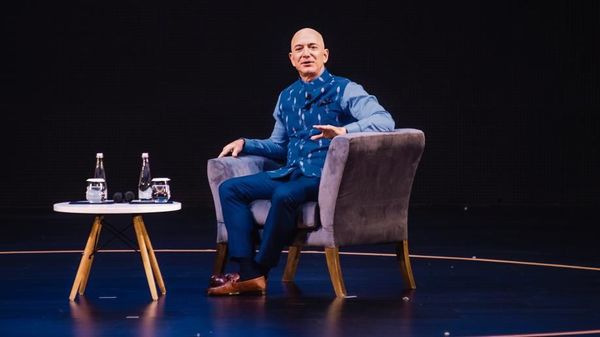Jeff Bezos, Amazon CEO, Jeff Bezos India trip, Make In India, human survival, manufacturing in Space, extra-planetary manufacturing, Elon Musk, SpaceX, climate change
Jeff Bezos, most famous as the world’s richest man and founder of Amazon.com Inc., has had much to say on his India trip that should please Indian ears. He announced a plan to export products worth $10 billion by 2025 under the Make In India initiative. He said that Amazon India, currently under antitrust scrutiny here, would invest $1 billion to help small and medium businesses go digital. He also declared that “the 21st century is going to be the Indian century”. What pleases us is one thing, though, and what intrigues us is another. Among the curiosity arousers he dangled, while talking about climate change and the possible need to escape Earth for human survival, was the idea of factories cranking out products away from the planet we currently inhabit. As the prime mover of Blue Origin, a space venture, he has touched upon extra-planetary manufacturing as a concept earlier, notably in the context of a space carrier the company is developing to haul cargo to the moon. However, a lunar factory was taken as just another pie-in-the-sky—cool, but a little too dreamy. But what if it can be done? And what if it actually makes sense?
Consider the state of space rivalry. While Elon Musk’s SpaceX has lowered flight costs with easily-reusable crafts for space tourism, Blue Origin is reported to have a strategic edge with heavy payload lifting, the kind that would be needed to set up a production unit on some other celestial body. Conceivably, the big set-up challenge would involve getting equipment up there, exactly what Bezos’s company appears to be working on. As for land acquisition, while no government can lay claim to extraterrestrial land and resources under the 1967 Outer Space Treaty, there is nobody out there to enforce it either, which means that finders get to be keepers. Operational costs need not be high. If the chosen location’s gravity is low (as on the moon), then it will take less energy to get machinery moving. Solar power could cheaply be harnessed (at one of the lunar poles, for example), and if a water source is tapped, it would yield oxygen and hydrogen to support life and generate fuel. With robots doing all the grunt work under the supervision of artificial intelligence, a labour force will not even be needed. Management by remote control is already a global reality, so that aspect should be no bother either. With luck, some raw material could be located right there, or less than a blink of light away. In 2015, the US enacted a law that grants its companies ownership of whatever useful material they find in space, so American firms could dig up stuff on other planets. They may even take a crack at mining asteroids, some of which are thought to be treasure troves of minerals. Most inputs would probably still need to be ferried from earth, however, and the markets for products made up there are likely to stay earthly for a long time to come. This being the case, the entire vision may eventually turn on the question of whether transport costs justify off-planet assembly lines.
It’s unclear if Bezos has done a thorough cost-benefit analysis of the idea. But India, as a cost-competitive space-faring nation, may find it worth the effort to embark on viability research for such a project. Our space agency could take it up rightaway. In time, private players could be allowed into the space sector. If factories ever start flying off, we should not be left grounded.


